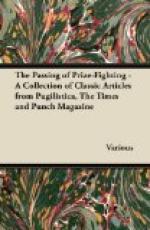Second Ditto. Oh, hang your quotations! Happy omen! ’Tis Leap Year, is it not? Just a leap; though, like DERBY’s, it be “in the dark,” and—well, we shall know where we are, anyhow!
First Ditto. Ah, just so; and that’s something!
[Left considering.
* * * * *
[Illustration: TEMPTATION.
Hairdresser. “ANY BAY-RUM, SIR?”
Middy. “THANK YOU—A—NO! NOT QUITE so EARLY IN THE MORNING—YOU KNOW!”]
* * * * *
“CLERK ME NO CLERKS.”
It seems Sir E.C.,
Q.C., likes
The
blatant, brazen, Boothian band,
Admires “abstaining”
zeal that strikes
The
biggest drum with boldest hand.
He says, “You must not judge some
others’ case
By tastes much more refined,” less
commonplace.
Yet, as Sir EDWARD
disagrees
With
those whose tastes he thus divined,
It’s manifestly
clear he sees
His
taste in music’s not “refined.”
’Twas written long ago by CHAUCER’s
pen,
“The gretest clerkes ben not the
wisest men.”
* * * * *
“MY DEAR EYES! WHAT! SEE-USAN!”
At the Prince of Wales’s, Mr. ARTHUR ROBERTS, as Captain Crosstree, is more ARTHUR ROBERTS than ever, and, consequently, immensely droll. While he is on the stage, the audience is convulsed with spasmodic laughter, excepting when he tries to forget himself and his drollery in a loyal attempt at doing justice to Messrs. SIMS’ AND PETTITT’s words, and to the serious business of some situation intended to be dramatic. At such moments the laughter of the House is checked, a sudden gloom comes over the faces that were but now on the broad grin, even the lineaments of Mr. ROBERTS become agonised, and the audience, like Christopher Sly when bored by the Duke’s players, mutter to themselves, “would t’were done.” But these painful seconds, which, at the time, seem hours, are, we are glad to say, but brief and passing shadows over Mr. ROBERTS’ own quaint humour which speedily reasserts itself, and, the Pettitt-and-Sims fetters being cast aside, the People’s ARTHUR is himself again, and more so than ever. And, when he is himself, he is simply the most absurd person that ever faced the footlights.
[Illustration: Arthur Roberts (to Arthur Williams). “The boat’s getting along nicely, now we’ve got rid of some of the heavy cargo.”]




